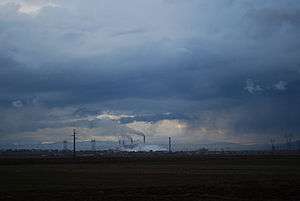Obilić
| Obilić / Obiliq | |
|---|---|
| Town and municipality | |
|
Obilić main street | |
 Obilić / Obiliq Location in Kosovo | |
| Coordinates: 42°41′N 21°04′E / 42.683°N 21.067°E | |
| Country | Kosovo[lower-alpha 1] |
| District | District of Pristina |
| Government | |
| • Mayor | Xhafer Gashi |
| Area | |
| • Total | 105 km2 (41 sq mi) |
| Elevation | 526 m (1,726 ft) |
| Population (2014) | |
| • Total | 21,056 |
| • Density | 200/km2 (520/sq mi) |
| Time zone | CET (UTC+1) |
| • Summer (DST) | CEST (UTC+2) |
| Postal code | 15000 |
| Area code(s) | +381 38 |
| Car plates | 01 |
| Website | Municipality of Obilic |
Obilić (Serbian Cyrillic: Обилић; Albanian: Obiliq or Kastriot) is a town and municipality in central Kosovo,[lower-alpha 1] belonging to the Pristina district. The municipality includes the town of Obilić and 19 villages, with a total population of ca. 21,056 (2008).[1]
The municipality is located immediately north-west of Pristina on the main road to Mitrovica. It was created in 1989, prior to which it formed part of Pristina municipality.[1]
Name

The name for the town, Obilić, refers to Serbian national hero Miloš Obilić who killed the Ottoman Sultan Murad I at the Battle of Kosovo (1389). In Albanian, the town is known as Obiliq (a transliteration of the Serbian name), while an alternative name (used by Albanian nationalists[2]) was coined by the Albanological Institute, Kastriot, after Albanian national hero George Kastrioti Skanderbeg (1405–1468).[3][4] It was prior to 1912 known as Globoderica (Глободерица).
Economy
Demographics
According to the 2011 census, the municipality had a population of 21,548. OSCE estimated in 2008 that the municipality had a population of approximately 19,500, the majority, some 15,000, Kosovo Albanian; minorities included some 2,200 Kosovo Serbs, 350 Roma, 300 Ashkali, 70 Bosnian Serbs and others.[1]
According to ECMI (2013), Novo Brdo is inhabited by a Serb minority (3,000 or 12.37%).[5]
Notes and references
Notes:
- 1 2 Kosovo is the subject of a territorial dispute between the Republic of Kosovo and the Republic of Serbia. The Republic of Kosovo unilaterally declared independence on 17 February 2008, but Serbia continues to claim it as part of its own sovereign territory. The two governments began to normalise relations in 2013, as part of the Brussels Agreement. Kosovo has received formal recognition as an independent state from 111 out of 193 United Nations member states.
References:
- 1 2 3 OSCE Mission in Kosovo: Municipal profile of Obilić Archived June 6, 2011, at the Wayback Machine., April 2008. – Retrieved on 30 October 2008.
- ↑ Andreas Wittkowsky (2011). Grand Hotel Kosovo: Schlaglichter einer europäischen Staatsbildung. LIT Verlag Münster. p. 69. ISBN 978-3-643-11425-9.
- ↑ Saskia Drude (2008). Hundert Wochen Kosovo: Alltag in einem unfertigen Land. Karin Fischer Verlag. p. 99. ISBN 978-3-89514-836-1.
- ↑ Jean-Arnault Dérens (2006). Kosovo: année zéro. Editions Paris-Méditerranée. p. 31. ISBN 978-2-84272-248-7.
- ↑ "Community Profile: Serb Community" (PDF). ECMI Kosovo. 2013.
External links
| Wikimedia Commons has media related to Obilić. |
Coordinates: 42°41′24″N 21°04′40″E / 42.69000°N 21.07778°E
